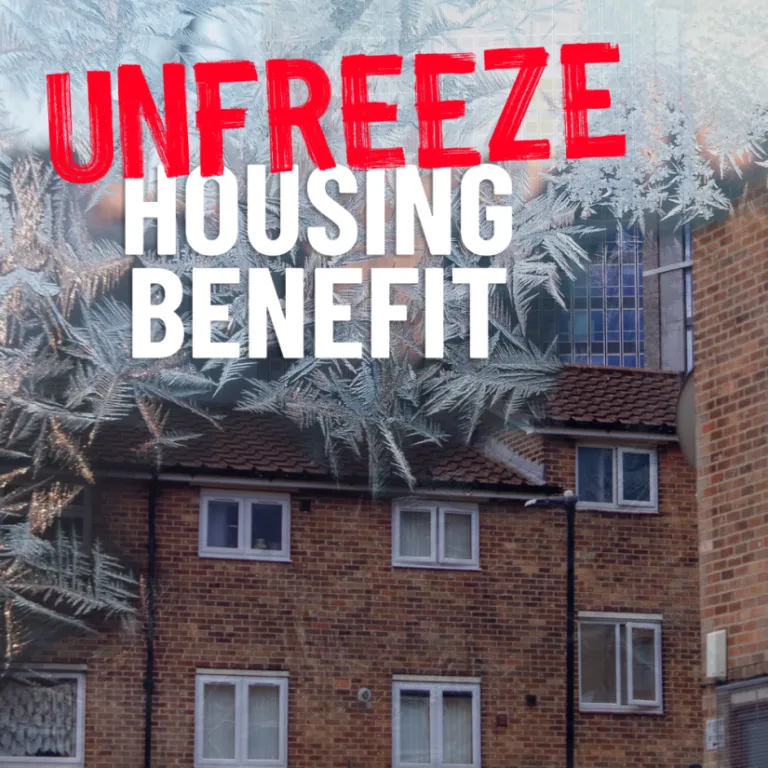Renters feel the freeze
Published: by Ella Nuttall

1.7 million private tenants now rely on housing benefit to afford a home. But housing benefit has been frozen for over three years, while rents have skyrocketed. Most renters now face shortfalls they must cover themselves – from income meant to cover their food or other essential bills – if they’re to afford a home.
New data from a freedom of information (FOI) request by Shelter to the Department for Work and Pensions reveals that housing benefit is so out of step with soaring rents that households only receive enough to cover just 80% of their rent, on average. Or, enough to pay rent for just nine and a half months of the year.
This is equivalent to renters on housing benefit being left with no income to cover their rent from today until the end of the year.
Local Housing Allowance (LHA) determines how much housing benefit private renters can receive to help them pay their rent. LHA is vital in tackling homelessness as it helps families and individuals who can’t access social housing be able to rent privately. The acute shortage of social rented homes, resulting in a waiting list of 1.2 million households, means people must have access to a private rented home if they’re to escape homelessness.
LHA has been frozen for more than three years, but rents have risen by 11% in England in that time. As a result, there’s an increasing disparity between LHA and the cost of rent. The consequence of this cruel freeze? The number of households who are homeless in England is the highest it has ever been, almost twice as high as a decade ago.
1.7 million private renting households feel the freeze
One in three private renters claim housing benefit. This is equivalent to 1.7 million private renting households. Data requested by Shelter from the Department for Work and Pensions shows that the majority have a shortfall. The average shortfall is now a shocking £163 a month. People on low incomes are being forced to find this money every month, or risk falling into arrears.
Shortfalls are prevalent across England. Renters in London and the South-East have the highest shortfalls. For example, renters in Thurrock are left with a £243 monthly shortfall on average. However, the issue is national with households in Greater Manchester, such as in Altrincham and Sale West, facing a £248 monthly shortfall. Households in rural areas are also suffering, with constituencies like North Dorset being forced to cover a £206 monthly shortfall. The map below shows each constituency’s average monthly shortfall.
Households have no choice about paying these shortfalls. They’re not choosing to live in expensive properties – the new data we received shows that rents paid by households on LHA are lower than average. Nor can they move somewhere else. LHA is so low that only 5% of homes on the market in England are affordable on LHA levels. Many LHA claimants are in work.
LHA deficiencies are putting local councils under huge pressure to procure more and more temporary accommodation (TA) for homeless families. Recent government figures revealed that councils spent a whopping total of £1.7bn on TA last year. The costs of TA are untenable for many, with 87% of homeless households reporting they were struggling to keep up with the costs of their TA.
The freezing of LHA and unaffordability of the private rental sector have resulted in a record number of 131,000 children living in TA. The ripple effects of TA are vast and hard-hitting. Over half of homeless households say that their health or their family’s health has suffered due to living in temporary accommodation. One in ten had to stop work altogether because of living in temporary accommodation.
The government must act now
Homelessness charities and councils are united in calling on the government to end the LHA freeze. A recent open letter from the ‘Cover the Cost Coalition’, addressed to Jeremy Hunt, was signed by 19 organisations, including St Mungo’s, Shelter, Trussell Trust and Save the Children.
The letter calls for LHA to be unfrozen and raises concerns about the consequences of its inadequacies. LHA is designed to support private renters and prevent homelessness, but instead, renters are being left out in the cold.
The countdown to the Autumn Statement on 22 November is on. The chancellor will be laying out the government’s spending plans for the year ahead. And he has a crucial choice to make. Whether to take urgent action to stop record homelessness or let it get even worse.
Your MP can put pressure on the chancellor to make the right choice. Use our tool to email your MP today. Tell Jeremy Hunt to stop record homelessness by unfreezing housing benefit so it covers at least the cheapest third of rents.